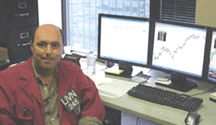From Floor To Screen Trading
Larry Levin
by Jayanthi Gopalakrishnan
Larry Levin is the president of Secrets of Traders, a commodity trading educational firm dedicated to helping traders succeed in the futures markets. He trades the Standard & Poor's 500 on the trading floor of the Chicago Mercantile Exchange (CME) and has been in and around the S&P 500 futures pit since 1989, where he started as a runner for Lind-Waldock. Levin moved up through the ranks from runner to phone clerk to desk manager of the S&P desk and began to trade for his own account in 1994.
In 1998 he formed Trading Advantage, a publishing company, to distribute his self-authored trading course, Secrets of Floor Traders. In 2000 he sold the rights to the course to Secrets of Traders, LLC, to market his products. He has recently written his newest trading course, The Secrets of an Electronic Futures Trader, designed to give the electronic futures trader the competitive edge.
STOCKS & COMMODITIES Editor Jayanthi Gopalakrishnan interviewed Larry Levin via telephone on November 2, 2006.

When it comes to trading, you need to be able to change when the market changes. Those who are already trading electronically are ahead.
Why is it so important for traders to think for themselves?
Unfortunately, most people don't want to take responsibility for their actions. The one major component an individual needs to be a successful trader is to take responsibility for their actions. They have to be an active winner and an active loser to play the market, to trade, and to be successful. If you are not willing to do these things in your own best interest, you will never have a chance to succeed. And that is the no. 1 reason most traders do not succeed.
What got you interested in trading?
When I was about 19, I was a year into college trying to get a marketing degree, and a few of my friends were working at the CME as runners, making maybe $3 an hour, and it looked cool. College didn't feel like it was for me at the time. I wasn't enjoying it at all, and what they were doing down on the trading floor, even if it was just taking orders to the trading pits and back, looked exciting. So I got a job as a runner for Lind-Waldock back in 1988. I was a year out of high school.
So you've been at it for a while.
I really haven't done much else, other than commodities.
What do you trade now?
I trade the emini S&P almost exclusively now. I was a floor trader up until 2005, and I still have my seat, but I trade as little as possible on the floor. I really feel as if there is not going to be a trading floor in two or three years, and anyone who is not well versed in screen trading will be in trouble.
Let's talk about the differences between floor trading and screen trading. Are screen traders at a disadvantage, given that they don't have the experience of a floor trader?
At this point, I would say the screen trader has the advantage over the floor trader. Unfortunately, most of the floor traders I'm acquainted with don't know a lot about computers. Many floor traders have tried to make the transition from the floor to the screen, and it doesn't transfer. However, the emotional side does transfer, and the ability to act in your best interest transfers. But getting the edge, which is the way most floor traders make their money - by playing off the customer orders and being able to buy on the bid and sell on the offer - is not available on the screen. Everybody has an equal shot.
Say there is no floor, and that the Chicago Mercantile Exchange decided to stop floor trading in 2009?10. The traders who are still on the floor are going to be at a disadvantage because they haven't spent their time training for the next step. That's the key to being successful. When it comes to trading, you need to be able to change when the market changes. Some people will. Some people won't. Those who are off the floor and already trading electronically are ahead.
You don't see a floor in two or three years? Is that because you see diminished interest among floor traders?
Yes. It is just much cheaper to trade electronically. If you trade on the floor, it takes three people. You need a person to place orders for the customers, a person receiving the order, and there's the broker. When you have a computer you don't need anyone to do the same job. Right now 75% of the volume done here at the Merc is done electronically. I doubt that number is going to get smaller. In fact, I am sure that after the first of the year the number will get bigger.
...Continued in the January 2007 issue of Technical Analysis of STOCKS & COMMODITIES
Excerpted from an article originally published in the January 2007
issue of Technical Analysis of STOCKS & COMMODITIES magazine.
All rights reserved. © Copyright 2006, Technical Analysis,
Inc.
Return to January 2007 Contents